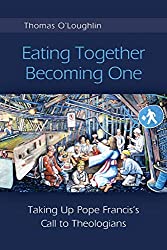
I was absolutely delighted to receive (unrequested), from Liturgical Press, a review copy of this book.
In November 2015, Pope Francis, visiting a Lutheran church in Rome was asked about intercommunion. The Pope’s off-the-cuff response was that theologians should address the question. This book is a response to that suggestion. Should those who are not members of the Roman Catholic Church be formally allowed to receive communion at a Roman Catholic Mass?
The book explores such things as the grammar of meals, being the Christian family together, our ecumenical responsibility to mission, building on our agreed ecumenical mutual acceptance of baptism, the Eucharist as nourishment for our pilgrim journey, and so forth.
Pope Francis was asked a question:
My name is Anke de Bernardinis and, like many persons of our community, I’m married to an Italian, who is a Roman Catholic Christian. We have been living happily together for many years, sharing joys and sorrows. And, therefore, it’s quite painful to be divided in the faith and to be unable to take part together in the Lord’s Supper. What can we do on this point to finally attain communion?
Pope’s Visit to Lutheran Community in Rome 2015
This is part of Pope Francis’ response (it is very worthwhile reading the whole response):
It’s not easy for me to respond to your question about sharing in the Lord’s Supper. especially in the presence of a theologian such as Cardinal Kasper. I’m afraid!I think the Lord has said it to us, when He gave this mandate: “Do this in memory of me.” And when we share the Lord’s Supper, we recall and imitate, we do the same thing that the Lord Jesus did. And there will be the Lord’s Supper, there will be the last banquet in the New Jerusalem, but it will be the last.
Pope’s Visit to Lutheran Community in Rome 2015
Instead on the journey, I wonder – and I don’t know how to answer, but I make your question my own, — I wonder: is the sharing of the Lord’s Supper the end of a journey or the viaticum to journey together? I leave the question to the theologians, to those who understand.
It’s true that in a certain sense to share is to say that there are no differences between us, that we have the same doctrine – I stress the word, a word that is difficult to understand – but I wonder: don’t we have the same Baptism? And if we have the same Baptism, we must walk together.
Thomas O’Loughlin, the author of this book, is professor of historical theology at the University of Nottingham, UK. As he could not find a book responding to the Pope’s encouragement, he produced one drawing on different disciplines including theological, liturgical, sociological, and pastoral.
The conclusion of the book draws on 3 new approaches: that we are sisters and brothers in the Spirit; the human grammar of meals; and that God’s heavenly meal be “on earth, as it is in heaven”. Each points towards allowing those beyond the RC jurisdiction to receive communion at a Eucharist presided over by a priest or bishop from within that jurisdiction.
I am a priest who serves in the Anglican Church in Aotearoa, New Zealand and Polynesia. This church inherited the Church of England’s restricting of communion to confirmed Anglicans. Then, for a time, there was “Admission to Communion” – a rite between baptism and confirmation that allowed younger children (say, from the age of 7ish) to receive communion from that point on. Finally, this Church decided that baptism IS admission to communion – all the baptised, whatever their age, whatever their denomination are welcome at the Lord’s Table.
To those who seek full doctrinal agreement as a prerequisite for gathering around the Lord’s Table, I suggest that even within Churches and Communions (where sharing communion is the norm) there is a diverse understanding of the mystery of Christ. Even when the same words are used, people mean different things by the agreed words – the agreed words can hide foundational difference, and disagreement about words may actually express differently an underlying unity. In the Church in which I serve, as in other Churches and Communions, there are agreements about how we celebrate Eucharist and how we treat the consecrated bread and wine. I hold to a catholic, orthodox understanding of the Eucharist – I am totally at ease to gather around the Lord’s Table with those who express their understanding quite differently if they, with me, hold to the agreed practices we have vowed and signed up to.
I am strongly supportive of the approach that welcomes all the baptised (whatever their age, whatever their denomination) at the Lord’s Table. To me, this is a natural consequence of recognising each other’s baptism into the one, holy, catholic, and apostolic church. I understand the Eucharist as “completing” baptism. I understand baptism as being “admission to communion”. In terms of initiation and immersion into the life of Christ, I understand Eucharist as being the repeatable part of this immersion – and as the nourishment for our growth in this new life. Furthermore, I understand it as the LORD’S Table – not mine, as the priest, not the bishop’s table… not even the Pope’s table…
I encourage you, who are interested in this discussion, to read Thomas O’Loughlin’s book. It is a scholarly, thoughtful, thorough exploration of the question many, not just Anke de Bernardinis, pose.
[/et_pb_text][/et_pb_column] [/et_pb_row] [/et_pb_section]



I agree with you Father B, on both points that you have made, 1) that we all share baptism and 2) that baptism is the entry to admission to the Lord’s table.
I remember back in the 80s when I first lived in Seattle with my partner, of blessed memory, Roberto, that we used to attend the Dignity* services and that the Priests of Dignity did not restrict the Eucharist to only RCs in the congregation.
*LGBTQ RCs